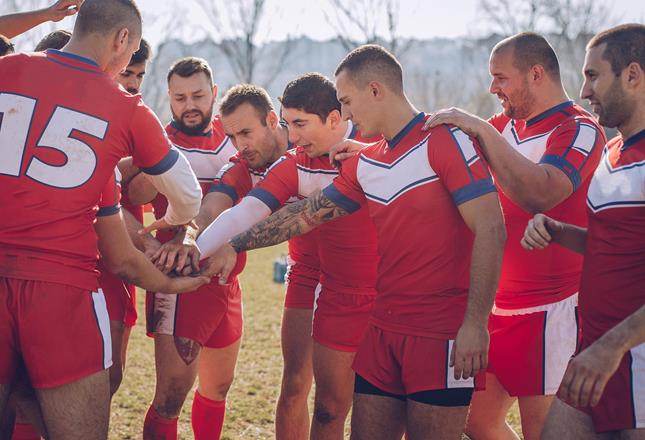
Mental health has blossomed in importance in recent years, and the sport sector has really stepped up in terms of acknowledging the potential of policy and practice to shape and improve real lives challenged by mental health.
In recent work I undertook with the Sport and Recreation Alliance we reviewed the existing literature to outdoor recreation and established the need to recognise the potential of nature-based recreation to be restorative and preventative for those who may suffer from poor mental health.
Likewise, in engaging with partners varying from government and national bodies through to the volunteer sector, I see a real change in the positioning of sport as a vehicle for good in this policy space.
This is also from the experience of someone that has had times of struggle with my own mental health. No labels, no categories, just struggles, like many men in sport. But, I am also an advocate for the role of community sport networks in supporting improved mental health.
But, it is much more than policy. Participants, community clubs and volunteers derive social benefits from a broad range of sport and physical activity spaces and landscapes they interact in and we must build on this momentum.
What we know is that a ‘return to nature’ brings benefits to our individual and community welfare.
Regular routines and structures for those with often ‘hidden’ or invisible challenges can be a lifeline in providing positive re-enforcement of the fact they can, and are, dealing with what can be incredibly hard for individuals and their families.
It’s also about what we can all do, in small ways, to challenge perceptions and drive conversations that can support the ‘Time to Change’ campaign which challenges stigma around mental health.
I have been around too many people in my career that have been affected by depression, panic attacks, through to thoughts of suicide and bipolar disorder.
It is not about the labels and terms we attach to such conditions or illnesses. Often, we find individuals and their close friends and families have highly personalised ways of describing and coping with the stigma and understanding that others may lack.
The key point is to grasp the need to start conversations.
It is this kind of conversation I have recently started through establishing a voluntary cycle group for men to be open and start talking about mental health. If they want to that is.
We also must respect the fact that people may not be ready to talk and the first steps of doing so, are so hard for many. High profile celebrity cases of mental health challenges are important.
In our cycle group we assume priority for the local and everyday experience. From April 5 – 8 we are cycling Coast to Coast for Manchester Mind as a group of men, dads, sons and fathers aged 12-70 that have all been touched by poor mental health, either individually or through our families.
While the event is good, and has got people talking, we believe it is the quiet country lane spaces of our Saturday and Sunday rides in the depths of winter that really matter.
Regular conversations spark peer support, someone experiences a family challenge and as men we support each other and our families.
Sport genuinely is our vehicle, but it is the coffee shop chat, supportive listening over a swig of ‘en-route’ water or a knowing look of concern that really drives the communal engine of support.
I hope that by opening up further conversations on this topic, more people can take a first step to set up or join a local group, being open about their motivation.
We are guessing you’ll find that many others then quietly ‘let on’ how they have been shaped, are still shaped by and are learning more about their own mental health.
I know, by being open myself, I get more people than you’d ever imagine giving you a knowing nod of shared experience. I know that for me there is no better place than the quiet lanes or a muddy mountain-biking adrenalin rush to provide me with shared collective support.
I support the Mental Health Charter, but as a Mind Volunteer, fundraiser and informal cycle group leader, I like to try and live my values in this most important of areas.
This year we are cycling on the weekend of Oct 13 - 14 in support of challenging the stigma and are also riding from Edinburgh to Durham over three days for the HelpforHeroes charity and Manchester MIND with a goal of raising £15,000. So far, we have 10 guys signed up and are happy to hear from others interested.
We are on twitter @menIn_MIND, come and join the movement for men to keep talking.
We are also a huge supporter this year of the Time to Change campaign 'Bloke in Your Corner' which we model ourselves on. We provide a safe space for men-only chat to talk or not, or just come and cycle. Sometimes we don't want to talk, just cycle, which is cool too.
It is with immense sadness that the Sport and Recreation Alliance learned of Andy Sutch’s passing last week, and we send our deepest condolences to Andy’s family and friends.
Read moreThis afternoon, the Chancellor delivered her Budget speech to Parliament, outlining decisions on tax and spending.
Read moreAhead of the Chancellor’s Budget statement on 26 November, we take a look a look at the key areas to be aware of and the work the Alliance has been doing lobbying on behalf of members.
Read moreJoining the Sport and Recreation Alliance is pretty simple, but worthwhile!
Register now